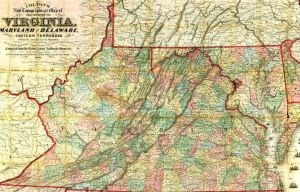 The current state of Southern Baptist thought and life has become so complex as to defy easy categorization. Southern Baptist newspapers, typically owned and published by well-to-do Baptists who represent the views of denominational leadership, deliver weekly dollops of defiance against the abolitionist United States, adding regular doses of optimism evidenced by this or that perceived hopeful sign, topped by the ever present reminder that God yet wants to preserve white supremacy and black slavery if only his chosen Confederacy will draw closer to him.
The current state of Southern Baptist thought and life has become so complex as to defy easy categorization. Southern Baptist newspapers, typically owned and published by well-to-do Baptists who represent the views of denominational leadership, deliver weekly dollops of defiance against the abolitionist United States, adding regular doses of optimism evidenced by this or that perceived hopeful sign, topped by the ever present reminder that God yet wants to preserve white supremacy and black slavery if only his chosen Confederacy will draw closer to him.
Meanwhile, many common folk white Baptists on the Southern home front have been reduced to subsistence living. Hunger is a daily fact of life, while many of their churches sit idle on Sundays. At the same time, Confederate Baptist soldiers, like other soldiers, are increasingly deserting the army due to disgust over defending the rights and riches of slave owners, as well as concern for the struggles of their families. Their stories are noticeably absent from the pages of their denomination’s newspapers and other publications.
Instead, as the dark clouds descend ever lower over the South, Southern Baptist newspapers wave the flag of Confederate patriotism and nationalism all the more desperately. Perhaps no story has more stoked the anger of newspaper editors and Southern Baptist leaders than the now two month-old news of the United States’ government-sanctioned re-starting of abandoned Baptist churches of the South with Northern Baptist ministers.
Today’s North Carolina Baptist Biblical Recorder illustrates this pervasive anger:
In a late issue of the Recorder we referred to the intention of the Yankees to deprive us to not only of our civil but also of our religious liberty. Below we give the practical workings of the plan. Our readers will see in it what is prepared for them for us all if we should be conquered in this war. The Yankee General Wilder, who won for him self such unenviable notoriety by his late raid with negro troops through Eastern N. C., has lately issued a General Order in Portsmouth and Norfolk, from which we make the following extract:
All places of public worship in Norfolk and Portsmouth are hereby placed under the control of the provost-marshals of Norfolk and Portsmouth respectively; who shall see the pulpits properly filled, by displacing when necessary, the present incumbents, and substituting men of known loyalty and the same sectarian denomination, either military or civil, subject to the approval of the commanding general.
They shall see that the churches are opened freely to all officers and soldiers, white or colored, at the usual hour of worship, and at other times, if desired; and they shall see that no insult or indignity be offered to them either by word, look or gesture, to the part of the congregation.
The necessary expenses will be levied as far as possible, in accordance with the previous usages of regulations of each congregation.
The United States government views control of churches in Union-occupied towns as a step toward reunification of North and South. Many white citizens of Union-controlled cities, other than Union sympathizers, feel insulted. Free blacks, until recently enslaved, celebrate their newfound religious equality.
Elsewhere in Virginia, Southern Baptists hope for revival in the Confederate Army and pray fervently for the triumph of white supremacy. This week’s Georgia Baptist Christian Index publishes a recent letter from a Baptist chaplain with the 38th Georgia Regiment.
….Oh, for a sweeping revival–one that will gather into its balmy wings every soldier of the Confederate army! Who, then, could withstand the children of Zion in battle array, with the blood-stained banner of King Emmanuel flying proudly in the breeze!–Then, that which we so ardently long for and continually pray for, would be gained, virtually, in a day. Peace would be no longer hidden behind the impenetrable veil of the future, but would spring out at once from beneath the mask and light upon our victorious columns. Then let us pray and pray fervently, as did Luther and John Knox, praying God to give us the Confederacy. Is it too much to ask for? Oh, no. The cause is God’s, and he will plead his own cause….
Cries for defense of white supremacy aside, many common folk white Baptists of the South are now convinced that the perpetuation of black slavery is not worth the destruction of their homes and homeland. U.S. President Abraham Lincoln‘s offer of pardon and amnesty is increasingly appealing, leading more and more Baptists, alongside other Southern whites, to pledge loyalty anew to the United States.
Not all are willing to acknowledge it just yet, but the high tide of the Confederacy is past, while the swell of freedom for all is rapidly rising.
Sources: “The Fate Prepared For Us,” Biblical Recorder, March 12, 1864 (link); “General Order No. 3, Norfolk, Va., Feb. 11, 1864,” in Edwin Scott Gaustad and Mark A. Noll, editors, A Documentary History of Religion in America, Volume 1, Grand Rapids, Mich.: Eerdmans, 2003, p. 551 (link); Jabez M. Brittain, “From the Camp,” Christian Index, March 11, 1864; see also David Williams, Rich Man’s War: Class, Caste, and Confederate Defeat in the Lower Chattahoochee Valley, Athens: University of Georgia Press, 1999 (link)


